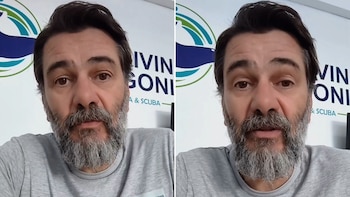
A few years ago, the IOC developed a marketing campaign with slogans that highlight the values of Olympism.
With the unmistakable and adorable phrase by Robin Williams, the saga revolved around concepts such as “there are people who believe that you don’t win a silver medal but that you lose a gold one. They’re the ones who never won a silver medal”.
Contrary to what many fans and not a few people in the press claim that it only matters to win and that no one remembers who came second, Olympism has given numerous evidence that its heroes are not only the ones who become champions; sometimes, our heroes don’t even win medals.
Derek Redmond, British, was part of the 4x400 meter champion pole at the Tokyo World Athletics Championship in 1991. He arrived in Barcelona ‘92 as one of the favorites to the podium in the individual event. Half way through the competition in the semifinals, he suffered a tear in the hamstrings of his right leg. Not only did he not stop, but the last few meters he did it accompanied almost in the arms of his father who did not hesitate to jump onto the track as soon as he noticed his son’s setback. That image between fatherly love and the desperate cries of the runner ended up being a highlight along with the magic of the Dream Team, the golden six of Vitaly Scherbo or the flight of Fu Mingxia from the platform with the Sagrada Familia in the background.
It’s not always the hero who triumphs.

Last day of Mexico ‘68. Marathon time. At 2000 meters above sea level and a temperature close to 30 degrees, almost a quarter of the batch of 75 participants abandoned the test. An Ethiopian named Mamo Wolde won the race and extended the hegemony of his country’s long-distance runners after Abebe Bikila’s double Olympic title.
However, history places John Stephen Akwari, an athlete from Tanzania whose record of just over 2 hours and 15 minutes presented him as one of the favorites, in a place of privilege similar to John Stephen Akwari. Even more so considering that Wolde won the test in 2 hours 20.
After the first half of the competition, Akwari suffered a severe fall that left him injured in several parts of his body. Especially the knees.
With the certainty that it would no longer be possible to reach the podium, Akwari did not hesitate to follow the route, partly walking, partly jogging. In the midst of an extraordinary standing ovation, he reached the finish line. He arrived last and one hour later than the champion.
“I never hesitated to continue till the end. My country didn’t send me more than 8000 kilometers away to only start the race. They sent me to fight till the end.”
The 1984 Los Angeles games meant much more than those of the Soviet response to the North American boycott four years earlier. They were, for example, those from the first women’s Olympic marathon.
An extraordinary North American long-distance runner named Joan Benoit won the race by showing an extraordinary pace of walking. A while after Benoit’s imposing entry into the mythical Olympic stadium used in 1932 and to be used in 2028, a crowd in the stands and on the TV held back the air before the shaky and exhausted image of the Swiss Gabrielle Andersen-Scheiss.
Born in Zurich and living in the United States from a young age, she had run a dozen marathons before achieving Olympic qualification.
“Five kilometers from the finish line, I started to lose control. The biggest setback, besides the heat, was the lack of hydration stations: just 5 throughout the trip. Anyway, my head always responded above the rest of my body. I had so much conviction in arriving that I still remember each of the final 200 meters today,” the woman who works at a flower shop in Idaho recently explained.
She finished 37th among the 44 that finished the test. Another heroine without medals.

Yusra Mardini was born and raised in Damascus, the capital of Syria. The war scenario in her homeland worsened, she emigrated together with her sister and managed to settle in Germany.
Settled in Berlin, she began training at Wasserfreunde Spandau 04. A year after leaving Syria, she made it to the Rio Olympics in 2016.
She competed in 100 meters medley and butterfly. In none of the tests she ranked better than 40a.
Why would Netflix (documentary The Swimmers) be interested in her story and that of her sister Sarah, who didn’t even make it to a game?
In 2015, after seeing how the civil war destroyed their native house, the two young women decided to flee the country. They escaped to Lebanon and, from there, to Turkey where they embarked together with 18 other people on a raft that could barely carry 8.
Away from the Greek coast, the boat’s engine stopped and the boat began to sink. Yusra, Sarah and two other people swam for three hours until they reached the coast of Lesbos.
Designated a UNHCR Goodwill Ambassador, Yusra is much more than an Olympic athlete without medals or relevant marks.
It is the symbol of yet another geopolitical victory for Olympism, which has more flags than the UN itself.
Últimas Noticias
Sinner-Alcaraz, the duel that came to succeed the three phenomenons
Beyond the final result, Roland Garros left the feeling that the Italian and the Spaniard will shape the great duel that came to help us through the duel for the end of the Federer-Nadal-Djokovic era.
Table tennis: Brazil’s Bruna Costa Alexandre will be Olympic and Paralympic in Paris 2024
She is the third in her sport and the seventh athlete to achieve it in the same edition; in Santiago 2023 she was the first athlete with disabilities to compete at the Pan American level and won a medal.

Rugby 7s: the best player of 2023 would only play the medal match in Paris
Argentinian Rodrigo Isgró received a five-game suspension for an indiscipline in the circuit’s decisive clash that would exclude him until the final or the bronze match; the Federation will seek to make the appeal successful.

Rhonex Kipruto, owner of the world record for the 10000 meters on the road, was suspended for six years
The Kenyan received the maximum sanction for irregularities in his biological passport and the Court considered that he was part of a system of “deliberate and sophisticated doping” to improve his performance. He will lose his record and the bronze medal at the Doha World Cup.

Katie Ledecky spoke about doping Chinese swimmers: “It’s difficult to go to Paris knowing that we’re going to compete with some of these athletes”
The American, a seven-time Olympic champion, referred to the case of the 23 positive controls before the Tokyo Games that were announced a few weeks ago and shook the swimming world. “I think our faith in some of the systems is at an all-time low,” he said.





